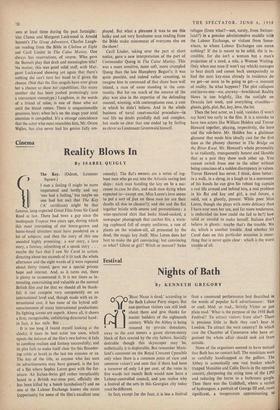Cinema
Reality Blows In
By ISABEL QUIGLY I HAD a feeling (I might be more impersonal and lordly and say `one had a feeling,' but maybe no one had but me) that The Key (`A' certificate) might be that famous, long-expected Great Film from Sir Carol Reed at last. There had been a gap since the inadequate Trapeze two years ago, during which this most interesting of our home-grown and home-based directors must have pondered on a lot of subjects; and then the story of this one sounded highly promising : a war story, a love story, a fantasy, something of a spook story . . maybe the fact that I saw Sir Carol in action, directing about ten seconds of it (it took the whole afternoon and the eight words of it were repeated about thirty times), gave me a special private hope and interest. And, as it turns out, there is plenty to recommend it. It is ten times as in- teresting, entertaining and valuable as the normal British film and for that we should all be thank- ful; it can compete very competently on an international level and, though made with an in- ternational cast, it has none of the hybrid self- consciousness of many international productions. Its fighting scenes are superb. Above all, it shows a firm, recognisable, unfaltering directorial hand : in fact, it has style. But ,. . .
It is too long (I found myself looking at the clock); it loses its best actor too soon, which upsets the balance of the film's two halves; it fails to combine realism and fantasy successfully; and its plot fails to make itself clear (to this flounder- ing critic at least) in the last ten minutes or so. The key of the title, as anyone who has seen its advertisements may have guessed, is the key of a flat where Sophia Loren goes with the fur- niture. An Italian-Swiss girl rather inexplicably based in a British war-time port, officially she has been killed by a bomb (symbolism?) and no one at the Labour Exchange knows she exists (opportunity for some of the film's excellent sour comedy). The flat's owners ate a series of tug- boat men who go out into the Atlantic saving lost ships : each man handing the key on fo a suc- cessor in case he dies, and each man dying when expected to—except one. Miss Loren's love seems to put a sort of jinx on these men (or are their deaths all due to chance?); and she and the flat together bristle with omens and premonitions : a wine-spattered shirt that looks blood-soaked, a newspaper photograph that catches fire, a warn- ing cupboard full of empty uniforms, a row of plants on the window-sill, all presented by the dead, the magic key itself. Miss Loren does her best to make the girl convincing; but convincing as what? Ghost or girl? Witch or mascot? Swiss refugee (from what?—not, surely, from Switzer- land?) in a genuine administrative muddle with the Labour Exchange, or visitant from Some- where, to whom Labour Exchanges can mean nothing? If she is meant to be solid, she is in- credible, for she isn't a woman but a man's projection of a need, a role, a Woman Waiting. Only when one man' (I won't say which) manages to beat death and comes back unexpectedly to find the next key-man already in residence, do we get—or seem to be going to get—a moment of reality. So what happens? The plot collapses and leaves one—me, anyway—bewildered. Reality blows in too brightly, like the sunlight on Dracula last week, and everything crumbles— ghosts, girls, plot, flat, key, love, the lot.
Thea the best actor, as I said, vanishes (I won't say how) too early in the film. It is a mistake to have two actors like William Holden and Trevor Howard together, playing, respectively, the hero and the sub-hero. Mr. Holden has a glutinous glamour that made him ideally cast for the first time as the phoney charmer in The Bridge on the River Kwai. Mr. Howard's whole personality is so radiantly, transparently honest and likeable that as a pair they show each other up. You cannot switch from one to the other without being conscious of a sudden discrepancy in values. Trevor Howard has never, I think, done better : in a walk, in a shrug, in a laugh or in a movement of his hands he can give his robust tug captain a real life around and behind him, a real problem in his flat and key and girl, a real future, a solid, not a ghostly, present. While poor Miss Loren, though she plays with more delicacy than I have ever seen her use, and far more tenderness, is undecided (as how could she fail to be?) how solid or unsolid to make herself. Italians don't believe in ghosts : maybe that's the trouble. We do, which is another trouble. And whether Sir Carol does on this particular occasion is some- thing that is never quite clear : which is the worst trouble of all.










































 Previous page
Previous page